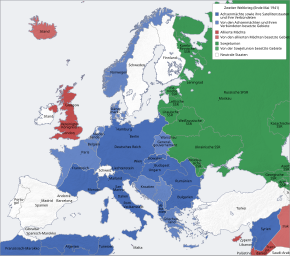
The Soviet offensive plans controversy was a debate among historians in the late 20th and early 21st centuries as to whether Joseph Stalin had planned to launch an attack against Nazi Germany in the summer of 1941. The controversy began with Soviet defector Viktor Suvorov with his 1988 book Icebreaker: Who started the Second World War? In it, he claimed that Stalin used Nazi Germany as a proxy to attack Europe.
The thesis by Suvorov that Stalin had planned to attack Nazi Germany in 1941 was rejected by a number of historians, such as Antony Beevor, Gabriel Gorodetsky, David Glantz and Dmitri Volkogonov and was partially supported by Valeri Danilov, Joachim Hoffmann, Mikhail Meltyukhov, and Vladimir Nevezhin.
The majority of historians believe Stalin sought to avoid war in 1941 because he believed his military was not prepared to fight German forces, though historians disagree on why Stalin persisted with his appeasement strategy of Nazi Germany despite mounting evidence of an impending German invasion.[1] Suvorov's main argument, that the Soviet government was planning to launch an offensive campaign against Nazi Germany, has been widely discredited as a historical distortion.[2]
- ^ Cite error: The named reference
Bar-Joseph Levy 2009was invoked but never defined (see the help page). - ^ Mawdsley, Evan (2016). "Hitler's war". Thunder in the east: The Nazi-Soviet war 1941–1945 (2nd ed.). New York City: Bloomsbury Academic. pp. 7, 8. ISBN 978-1-4725-1166-9.